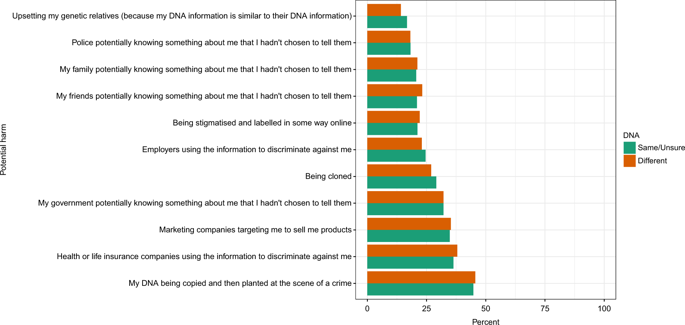European Journal of Human Genetics ( IF 3.7 ) Pub Date : 2019-11-29 , DOI: 10.1038/s41431-019-0550-y Anna Middleton 1, 2 , Richard Milne 1, 3 , Heidi Howard 4 , Emilia Niemiec 4 , Lauren Robarts 1 , Christine Critchley 5 , Dianne Nicol 6 , Barbara Prainsack 7, 8 , Jerome Atutornu 1, 2, 9 , Danya F Vears 10, 11, 12, 13 , James Smith 14 , Claire Steed 14 , Paul Bevan 14 , Erick R Scott 15 , Jason Bobe 15, 16 , Peter Goodhand 17 , Erika Kleiderman 18 , Adrian Thorogood 18 , Katherine I Morley 1, 19, 20, 21 ,

|
Public acceptance is critical for sharing of genomic data at scale. This paper examines how acceptance of data sharing pertains to the perceived similarities and differences between DNA and other forms of personal data. It explores the perceptions of representative publics from the USA, Canada, the UK and Australia (n = 8967) towards the donation of DNA and health data. Fifty-two percent of this public held ‘exceptionalist’ views about genetics (i.e., believed DNA is different or ‘special’ compared to other types of medical information). This group was more likely to be familiar with or have had personal experience with genomics and to perceive DNA information as having personal as well as clinical and scientific value. Those with personal experience with genetics and genetic exceptionalist views were nearly six times more likely to be willing to donate their anonymous DNA and medical information for research than other respondents. Perceived harms from re-identification did not appear to dissuade publics from being willing to participate in research. The interplay between exceptionalist views about genetics and the personal, scientific and clinical value attributed to data would be a valuable focus for future research.
中文翻译:

美国、英国、加拿大和澳大利亚表达遗传例外论的公众表示,他们更愿意捐赠基因组数据。
公众接受度对于大规模共享基因组数据至关重要。本文研究了数据共享的接受程度如何与 DNA 和其他形式的个人数据之间的感知相似性和差异相关。它探讨了来自美国、加拿大、英国和澳大利亚 ( n = 8967)的代表性公众 对捐赠 DNA 和健康数据的看法。52% 的公众对遗传学持有“例外论”观点(即认为 DNA 与其他类型的医学信息相比是不同的或“特殊的”)。这个群体更有可能熟悉或有过基因组学的个人经验,并认为 DNA 信息具有个人以及临床和科学价值。那些有遗传学和个人经验的人遗传例外论者愿意为研究捐赠匿名 DNA 和医学信息的可能性几乎是其他受访者的六倍。重新识别的感知伤害似乎并没有阻止公众愿意参与研究。关于遗传学的例外论观点与归因于数据的个人、科学和临床价值之间的相互作用将是未来研究的一个有价值的焦点。











































 京公网安备 11010802027423号
京公网安备 11010802027423号